
travel
Grown-ups Play Hide and Seek for Cache
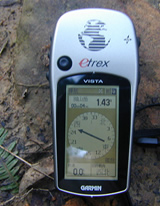 Kids always enjoy a scavenger hunt, but now adults can play their own version of the game with cool global positioning system (GPS) devices that pinpoint your location down to the exact longitude and lattitude. Made possible by dozens of satellites that orbit the earth, the technology is now available to everyone who has a GPS device. Some are handhelds that can be purchased for less than $100, but they are also used by sailors and others who have some serious navigation requirements.
Kids always enjoy a scavenger hunt, but now adults can play their own version of the game with cool global positioning system (GPS) devices that pinpoint your location down to the exact longitude and lattitude. Made possible by dozens of satellites that orbit the earth, the technology is now available to everyone who has a GPS device. Some are handhelds that can be purchased for less than $100, but they are also used by sailors and others who have some serious navigation requirements.
Known as geocaching, 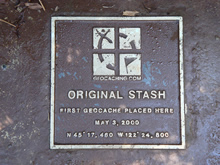 the game is an entertaining way to get outdoors, get some exercise, and join likeminded individuals and groups. Someone or some group sets up a cache somewhere (the game is played world-wide now) and then shares the locations over the internet. GPS users locate the coordinates and try to find the cache. When they find it, there may be a modest reward or prize, but they are also expected to leave something in the cache for the next searcher. They may also
the game is an entertaining way to get outdoors, get some exercise, and join likeminded individuals and groups. Someone or some group sets up a cache somewhere (the game is played world-wide now) and then shares the locations over the internet. GPS users locate the coordinates and try to find the cache. When they find it, there may be a modest reward or prize, but they are also expected to leave something in the cache for the next searcher. They may also 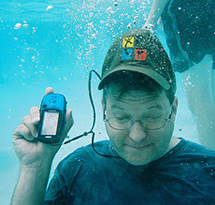 record their find in the logbook that is kept with the cache.
record their find in the logbook that is kept with the cache.
It sounds easy to locate the coordinates since the GPS devices are accurate to within 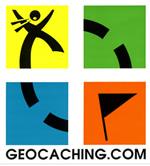 6-20 feet. The satellite broadcasts positions via radio frequencies and the GPS unit uses that information to triangulate your location. But what if the cache is under water, in a steep canyon, or behind a waterfall? Knowing the exact coordinates of the cache doesn’t mean it’s an easy location to access–and therein lies the thrill of the chase.
6-20 feet. The satellite broadcasts positions via radio frequencies and the GPS unit uses that information to triangulate your location. But what if the cache is under water, in a steep canyon, or behind a waterfall? Knowing the exact coordinates of the cache doesn’t mean it’s an easy location to access–and therein lies the thrill of the chase.
To learn the cache coordinates you can go to sites such as geocaching.com 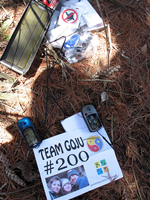 and enter your zipcode or state and country and find hundreds of caches. There are so many people who have taken up this pursuit game that you will most likely be shocked to learn how many caches are in your area. They may be in a public park, on a small island, behind the library, etc. The U.S. National Park Service and Wildlife Refuges are off limits, and naturally anthing that defaces public property is a no-no. Most geocachers respect public and private property but you can get more complete guidelines here.
and enter your zipcode or state and country and find hundreds of caches. There are so many people who have taken up this pursuit game that you will most likely be shocked to learn how many caches are in your area. They may be in a public park, on a small island, behind the library, etc. The U.S. National Park Service and Wildlife Refuges are off limits, and naturally anthing that defaces public property is a no-no. Most geocachers respect public and private property but you can get more complete guidelines here.
Even though mostly adults are drawn to this high tech Easter egg hunt, it is an activity that you can share with children and grandchildren. Many of the caches are in easily accessible locations that a family can find together. Plus, it’s a lot fun to see the reactions of muggles (those who are have not been exposed to the joys of geocaching) when you find your “pot of gold.”
Jay Harrison is a graphic designer and writer whose work can be seen at DesignConcept. He's written a mystery novel, which therefore makes him a pre-published author.
Got a 400 word travel piece you'd like to contribute? Click here.
© 2006-2013 ConceptDesign, Inc. Terms of Use
BoomSpeak - For babyboomers - by babyboomers.